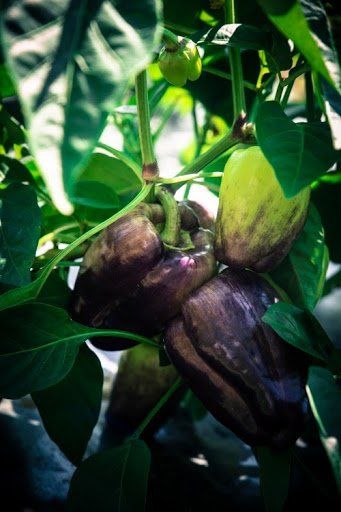August, already?
August, finally??
In a year that keeps throwing curve balls, we are looking at a potential tropical storm coming upon us in the midst of a significant drought. At the time of writing this, we are grateful that the forecast doesn't predict damaging winds. Yet, torrential rainfall still has the potential to do significant harm, as the soil is so dry and hardened that it cannot absorb the rain fast enough to prevent massive runoff and erosion. On the plus side, the rain could refill our irrigation ponds and local waterways that have been extremely low and at points, completely dry.

In previous newsletters we have talked about how we use drip irrigation underneath mulch to efficiently water the roots of certain crops, particularly those that take the entire season to produce fruits (e.g. tomatoes, eggplants, peppers, some squash, onions etc.) However the mulch and the drip tape used on those crops are a significant expense in both materials and labor. Some crops, like carrots, peas, beans, winter squash, sweet corn and others are not practical to put onto mulch and drip irrigation, thus we are more dependent upon rainfall in order to keep them alive and producing.
This year we have further invested in overhead irrigation tools that use a combination of pumps, reels, tractors and spray guns to keep open field planted crops alive when the weather refuses to cooperate. We have at least one person working on this system every day of the week, as it takes a significant amount of time and effort to rebuilt and transport the system when it needs to be moved into different areas of the field. .jpg)


Video of overhead irrigation working
Hopefully, we will get some rain soon that will allow us to replenish our water sources and spend some time on other projects.
Melon Storage and handling tips - In the coming weeks, your share may contain cantaloupe or torpedo melon and hopefully eventually a watermelon at some point. Because of the rough texture of the melons, which are grown in a natural environment, it is a good idea to follow the safety tips outlined here from the University of Wisconsin Extension office: At home, refrigerate cantaloupes promptly. Wash hands with hot, soapy water before and after handling fresh melons. Scrub whole cantaloupes by using a clean produce brush and cool tap water immediately before eating. If you use soap or detergents, be sure to rinse the melon well before slicing. Use clean cutting surfaces and utensils when cutting cantaloupes.

Wash cutting boards, countertops, dishes, and utensils with hot water and soap between the preparation of raw meat, poultry, or seafood and the preparation of cantaloupe (or any other raw food.) If there happens to be a bruised or damaged area on a cantaloupe, cut away those parts before eating it. Like all foods, leftover cut melons should be discarded if left at room temperature for more than two hours.
If you have more melon than you can manage in a few days, you can dice it and freeze it. Freezing a melon puree will give you a thawed product that is gritty and not very tasty at all. You can however freeze melons in chunks with minimal change in texture and taste.
This year we have grown some "personal sized" cantaloupes called Tasty Bites. They only get to be about the size of a large softball, but what they lack in size they make up for in sweetness. Also new to many this year, are some yellow Korean-type melons, called Torpedoes. These little guys are lemon yellow with white stripes and are described as "refreshingly crisp and moderately sweet with a white flesh."


Some of the produce you receive has been washed from the field, but like all fresh produce, should be thoroughly washed and, usually, refrigerated by you at home.
THE EXCEPTIONS TO THE REFRIGERATION RULE ARE Eggplant and TOMATOES. Tomatoes and eggplant should never be refrigerated until they are cut or prepared, as the cold changes their texture.
Week 7 Pinterest board: https://pin.it/6mkr4y2hbcmqf7




